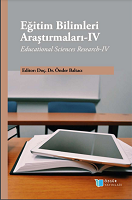Üniversite Öğrencilerinin Epistemolojik İnançları Ve Öğrenme Yaklaşımları
University Students' Epistemological Beliefs and Learning Approaches
Author(s): Fikret Gülaçtı, Zeynep Çiftci
Subject(s): Education, Epistemology, Higher Education , Sociology of Education
Published by: Özgür Yayın Dağıtım Ltd. Şti.
Keywords: education; epistemology; epistemological beliefs; students; learning approaches;
Summary/Abstract: This research was conducted to examine the relationship between university students' epistemological beliefs and learning approaches. The study group of the research consisted of 174 (131 Female, 43 Male) students studying at the PDR 1st and 2nd grade at Erzincan Binali Yıldırım University in the 2018-2019 academic year. The research is a descriptive study conducted in relational screening model. Personal Information Form, Epistemological Belief Scale and Learning Approaches Scales were used as data collection tools in the research. The research data were subjected to normality tests and analyzes were made according to the results. Data were analyzed with Mann Whitney U Test, Anova, Kruskal Wallis H Test. According to the results of the research, there is no significant difference between the epistemological beliefs of the students and their perceived academic achievement levels, their perceived parental attitudes and the variables of who makes the department choice. There is no significant difference between the learning approaches of the students and the variable who chooses the department. In all sub-dimensions and the total score, the epistemological belief mean score of women is higher than the mean score of men. There is a significant relationship between the students' learning approaches sub-dimension, the deep learning approach and strategic learning scores, and the gender variable. There is a significant difference between the strategic learning approach, which is the sub-dimension of students' learning approach, and the variable of perceived academic success. There is a significant difference between the students' learning approach sub-dimension, the surface learning approach, and their perceived parental attitudes.
Book: Eğitim Bilimleri Araştırmaları - IV
- Page Range: 19-36
- Page Count: 18
- Publication Year: 2023
- Language: Turkish
- Content File-PDF

